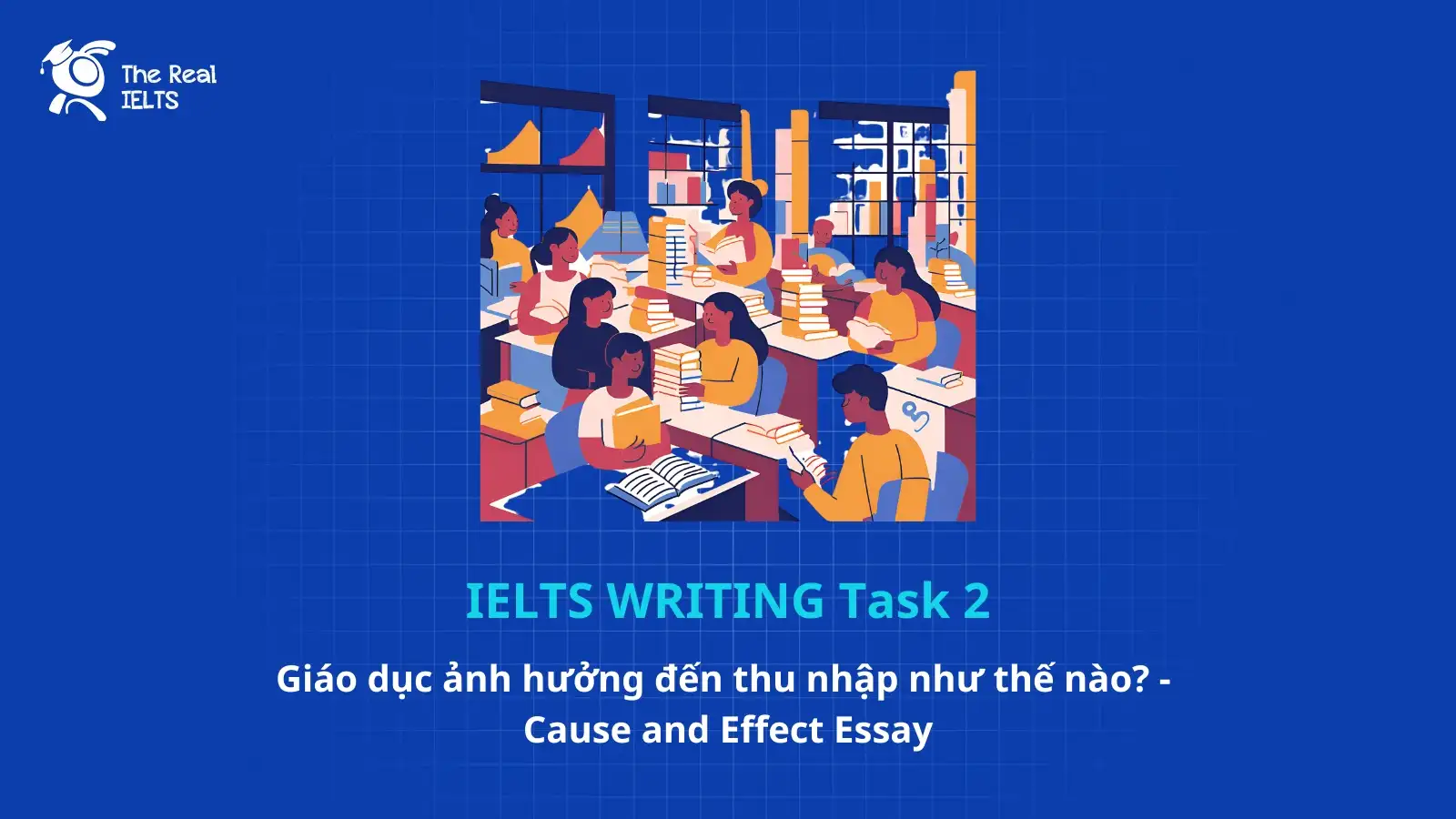Đề bài IELTS Writing task 2 dạng dạng Advantages and Disadvatages: Global Trade
You should spend about 40 minutes on this task
The reliance on international trade for economic growth. Do the advantages of this outweigh the disadvantages?
Write at least 250 words.
Bài mẫu IELTS Writing Task 2 dạng Advantages and Disadvatages: Global Trade
Introduction
In today’s interconnected world, international trade plays a crucial role in the economic growth of nations. The reliance on global trade has brought about significant benefits, such as increased access to markets and the ability to specialize in production. However, it has also introduced challenges, including dependency on foreign economies and vulnerability to global market fluctuations. This essay will explore both the advantages and disadvantages of relying on international trade, ultimately arguing that the benefits outweigh the drawbacks.
Body Paragraph 1: Advantages
One of the primary advantages of international trade is the access it provides to a broader market. Countries can export goods and services beyond their borders, reaching a global customer base. This expanded market access allows nations to increase their sales, boost production, and achieve higher economic growth. For instance, countries like South Korea and Germany have thrived by exporting automobiles and electronics worldwide, significantly contributing to their GDP growth.
Another significant advantage is the ability of countries to specialize in the production of goods and services in which they have a comparative advantage. This specialization leads to more efficient production processes, reducing costs and enhancing the quality of goods. For example, Japan specializes in high-tech electronics and automobiles, while countries like Brazil focus on agriculture. This specialization not only benefits the producing countries but also provides consumers around the world with a diverse range of high-quality products at lower prices.
Body Paragraph 2: Disadvantages
However, relying on international trade also has its disadvantages. One major drawback is the increased dependency on foreign economies. When a country relies heavily on exports, any economic downturn in its trading partners can severely impact its own economy. For example, during the global financial crisis of 2008, countries that were heavily dependent on exports, such as China and Germany, experienced significant economic slowdowns due to reduced demand from other countries.
Another disadvantage is the vulnerability to global market fluctuations. International trade exposes countries to external shocks, such as sudden changes in commodity prices or trade policies. A recent example is the impact of the COVID-19 pandemic, which disrupted global supply chains and led to significant economic challenges for countries dependent on international trade. Nations that relied heavily on imports for essential goods faced shortages, highlighting the risks of over-reliance on global trade.
Conclusion
In conclusion, while there are undeniable disadvantages to relying on international trade, such as economic dependency and vulnerability to global market fluctuations, the advantages, including access to broader markets and the ability to specialize in production, are more significant. Therefore, the benefits of international trade in fostering economic growth outweigh the drawbacks. Countries should continue to engage in global trade but with strategies to mitigate potential risks, ensuring sustainable and resilient economic development.
Thống kê cấu trúc câu và cấu trúc ngữ pháp
1. Cấu trúc câu
- Câu đơn (Simple sentences):
- Câu 1: “In today’s interconnected world, international trade plays a crucial role in the economic growth of nations.”
- Câu 2: “This expanded market access allows nations to increase their sales, boost production, and achieve higher economic growth.”
- Câu 3: “Another significant advantage is the ability of countries to specialize in the production of goods and services in which they have a comparative advantage.”
- Câu phức (Complex sentences):
- Câu 1: “However, it has also introduced challenges, including dependency on foreign economies and vulnerability to global market fluctuations.”
- Câu 2: “This specialization leads to more efficient production processes, reducing costs and enhancing the quality of goods.”
- Câu 3: “When a country relies heavily on exports, any economic downturn in its trading partners can severely impact its own economy.”
- Câu ghép (Compound sentences):
- Câu 1: “Countries can export goods and services beyond their borders, reaching a global customer base.”
- Câu 2: “This specialization not only benefits the producing countries but also provides consumers around the world with a diverse range of high-quality products at lower prices.”
- Câu 3: “Nations should continue to engage in global trade but with strategies to mitigate potential risks, ensuring sustainable and resilient economic development.”
- Câu ghép phức (Compound-complex sentences):
- Câu 1: “For instance, countries like South Korea and Germany have thrived by exporting automobiles and electronics worldwide, significantly contributing to their GDP growth.”
- Câu 2: “Nations that relied heavily on imports for essential goods faced shortages, highlighting the risks of over-reliance on global trade.”
2. Cấu trúc ngữ pháp
- Thì hiện tại đơn (Present Simple Tense):
- “International trade plays a crucial role…”
- “This specialization leads to more efficient production processes…”
- Thì hiện tại hoàn thành (Present Perfect Tense):
- “However, it has also introduced challenges…”
- Câu điều kiện loại 1 (First Conditional):
- “When a country relies heavily on exports, any economic downturn in its trading partners can severely impact its own economy.”
- Cụm danh từ (Noun Phrases):
- “A broader market”
- “Significant economic challenges”
- “Global supply chains”
- Cụm động từ (Verb Phrases):
- “To specialize in the production”
- “To mitigate potential risks”
- Mệnh đề quan hệ (Relative Clauses):
- “Goods and services in which they have a comparative advantage”
- “Countries like South Korea and Germany have thrived by exporting automobiles and electronics worldwide.”
- Câu bị động (Passive Voice):
- “This expanded market access allows nations to increase their sales…”
- “Nations should continue to engage in global trade but with strategies to mitigate potential risks.”
Các từ vựng tiếng Anh cần lưu ý trong bài viết
1. Interconnected world
- Giải thích: Một thế giới mà các quốc gia, nền kinh tế và xã hội ngày càng liên kết chặt chẽ với nhau.
- Ngữ cảnh: “In today’s interconnected world, international trade plays a crucial role…”
2. International trade
- Giải thích: Giao thương quốc tế, hoạt động mua bán hàng hóa và dịch vụ giữa các quốc gia.
- Ngữ cảnh: “International trade plays a crucial role in the economic growth of nations.”
3. Economic growth
- Giải thích: Sự tăng trưởng kinh tế, tức là sự gia tăng về sản lượng hàng hóa và dịch vụ của một quốc gia.
- Ngữ cảnh: “International trade plays a crucial role in the economic growth of nations.”
4. Global market fluctuations
- Giải thích: Biến động trên thị trường toàn cầu, những thay đổi đột ngột và không ổn định trong nền kinh tế thế giới.
- Ngữ cảnh: “Vulnerability to global market fluctuations.”
5. Comparative advantage
- Giải thích: Lợi thế so sánh, khả năng của một quốc gia hoặc doanh nghiệp sản xuất hàng hóa với chi phí thấp hơn so với đối thủ.
- Ngữ cảnh: “Countries to specialize in the production of goods and services in which they have a comparative advantage.”
6. Specialization
- Giải thích: Sự chuyên môn hóa, khi một quốc gia hoặc doanh nghiệp tập trung sản xuất một loại sản phẩm nhất định.
- Ngữ cảnh: “This specialization leads to more efficient production processes.”
7. Dependency
- Giải thích: Sự phụ thuộc, khi một quốc gia phụ thuộc quá nhiều vào một quốc gia khác hoặc vào một loại sản phẩm.
- Ngữ cảnh: “Dependency on foreign economies.”
8. External shocks
- Giải thích: Cú sốc từ bên ngoài, những tác động tiêu cực từ bên ngoài có thể ảnh hưởng đến nền kinh tế của một quốc gia.
- Ngữ cảnh: “International trade exposes countries to external shocks.”
9. Sustainable development
- Giải thích: Phát triển bền vững, sự phát triển kinh tế mà không gây tổn hại đến tài nguyên và môi trường cho các thế hệ tương lai.
- Ngữ cảnh: “Ensuring sustainable and resilient economic development.”
10. Supply chains
Giải thích: Chuỗi cung ứng, mạng lưới các hoạt động, con người, tổ chức, thông tin và nguồn lực liên quan đến việc di chuyển một sản phẩm hoặc dịch vụ từ nhà cung cấp đến khách hàng.
Ngữ cảnh: Disrupted global supply chains.
Từ vựng liên quan đến lợi ích:
- Broader market: Thị trường rộng lớn hơn.
- Increased access: Tăng cường tiếp cận.
- Boost production: Tăng cường sản xuất.
- Efficient production processes: Quy trình sản xuất hiệu quả.
Từ vựng liên quan đến bất lợi:
- Economic dependency: Sự phụ thuộc về kinh tế.
- Economic downturn: Suy thoái kinh tế.
- Risks of over-reliance: Rủi ro từ việc phụ thuộc quá nhiều.
Đọc thêm về bài viết gợi ý luyện thi IELTS.















